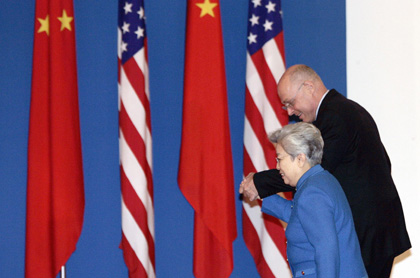China-US dialogue yields 'encouraging' consensus
(Xinhua/agencies)Updated: 2006-12-15 13:15
 US Treasury Secretary Henry Paulson (R) and China's Vice-Premier Wu Yi hold hands as they arrive for a joint news conference at the Great Hall of People in Beijing December 15, 2006. [Reuters]  |
"We have reached a number of consensus, although we remained different on some issues," Chinese Vice Premier Wu Yi told the press after the two-day landmark dialogue. "That such differences remain is understandable because the actual situations of China and the United States are completely different," Wu said.
She said the two sides had not seen eye to eye on every issue, but that was understandable given the economic differences between China and America.
The two governments also pledged to explore how to boost bilateral investment and to ease travel restrictions.
US Treasury Secretary Henry Paulson also hailed the dialogue, saying "It is important and encouraging that we have agreed on so many principles in the dialogue."
He said China has pledged greater exchange-rate flexibility but gave no timetable as the two sides wrapped up two days of talks.
"We each will take measures to address global imbalances through greater national savings in the United States and to increase consumption and exchange rate flexibility in China," said Paulson, who is leading a high-profile US trade mission to the dialogue.
"The United States and China know that our economic relationship is best when it produces benefits for both our countries. And we know that balanced sustainable growth in China is vital to the strength of the global economy," Paulson said.
"We will each take measures to address global imbalances, notably through greater national savings in the United States and through increased domestic consumption and exchange rate flexibility in China, and maintaining open investment in both countries," he added.
In a fact sheet released at the end of the dialogue, China and the United States reaffirmed their commitment to pursuing macroeconomic policies.
"China will carry out the exchange rate regime reform and the United States will increase saving rates so as to promote balanced and strong growth and prosperity in two nations," the fact sheet said.
The second strategic economic dialogue will be held in Washington in May next year.
|
||
|
||
|
|

